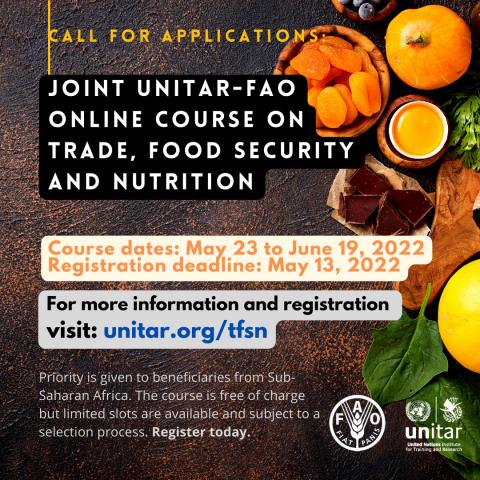
UNITAR Online Catalogue
Trade, Food Security and Nutrition (2022)

Prosperity
Background
This online course is delivered jointly with the Food and Agriculture Organization of the United Nations (FAO).
Through the 2014 Malabo Declaration, African governments made a specific and clear commitment to boosting intra-African trade in agricultural commodities and services, and to harnessing market and trade opportunities locally, regionally, and internationally. This is increasingly regarded as a means to promote agricultural transformation in sub-Saharan Africa (SSA), since it can help address the key challenges to agricultural development in the region such as diverse agro-ecological systems, and small national markets.
In this context, the relationship between trade and food security is attracting increased attention on both the trade and the development agendas. The eradication of global hunger by 2030 is a key goal in the new 2030 Agenda for Sustainable Development, and trade is recognized as one of the means for achieving the SDGs. The challenge is how to ensure that the expansion of agricultural trade works for and not against, the elimination of hunger, food insecurity and malnutrition. This challenge has been at the forefront as governments’ struggle to negotiate the changes to the current global agreements on agricultural trade that are needed to ensure that trade results in enhanced food security.
The increasing need for trade experts to support trade related development agenda in the region has posed a major challenge. National and regional institutions need to develop technical capacity and resources to map out national, sub-regional and regional level trade priorities and constraints; to empirically assess the implications of their multiple memberships on trade, food security and nutrition; to formulate appropriate mitigation policies and strategies; or to negotiate trade agreements that boost gains from trade and specialization.
This course therefore seeks to strengthen capacities in Eastern and Southern Africa, to develop and implement evidence-based trade policies, and to formulate and negotiate trade agreements, taking into consideration both their needs for economic growth and structural transformation, as well as their food security and nutrition concerns.
Learning Objectives
By the end of the course, participants will be better able to:
- Assess the challenges and opportunities posed by greater openness to trade for food security and nutrition;
- Describe different types of trade policy measures, their role in promoting food security and nutrition, and considerations for trade policy design and implementation; and
- Discuss the key global policy and regulatory frameworks governing trade, food security and nutrition, including the WTO Agreement on Agriculture and Agenda 2030.
Content and Structure
The course is composed of three units, each of which comprises of two to three lessons and presents conceptual linkages and practical regional experiences on trade and food security and nutrition.
Unit 1: Introduction to Trade, Food Security and Nutrition
- Lesson 1.1: Definitions and Linkages between Trade, Food Security and Nutrition
- Lesson 1.2: Impacts of Trade on Food Security and Nutrition
Unit 2: Trade Policy Supportive of Food Security and Nutrition
- Lesson 2.1: Trade Policy Measures and Agricultural Development
- Lesson 2.2: Design and Implementation of Trade Policy Measures
Unit 3: Governance of Trade, Food Security and Nutrition
- Lesson 3.1: Introduction to the Multilateral Trading System
- Lesson 3.2: Policy Space for Food Security in the Multilateral Trading System
- Lesson 3.3: Towards Improved Governance for Trade, Food Security and Nutrition
Methodology
The course will be conducted in English over a period of four weeks, organized in three units. The course will be delivered via the e-learning platform developed by the United Nations Institute for Training and Research (UNITAR, http://www.unitar.org), using training materials developed by FAO. This pedagogical tool will help participants meet the course’s learning objectives through a self-paced study routine with optional and required readings, case study exercises, discussion forums and assessment quizzes. The course will also include the provision of webinars, and it will be facilitated and mentored by international experts who have a wealth of practical experience to ensure that real-world examples are integrated into the coursework.
Targeted Audience
This course is designed to assist representatives from government and related authorities, who are directly involved in the formulation and implementation of agricultural policies and programmes in Eastern and Southern Africa. These may include officials from Ministries of Agriculture, Livestock; Ministries of Trade, Commerce, Industry; Ministries of Finance, Economy; and Food Safety, Sanitary, Phytosanitary, Veterinary and other authorities.
Private sector participants such as representatives from producer, agro-industry as well as traders associations will also benefit from the course.
Researchers with interest in agricultural policy and trade analysis are also encouraged to apply.
Priority will be given to policy makers and practitioners who impact agricultural trade through regional, national or sector-level actions, and professionals who are able to convey information and provide technical advice to their constituencies (trainers, professional staff of producer organizations, extension officers etc.)
Additional Information
This course is offered free of charge and will be conducted in English language only. Limited slots are available and will be subject to a selection process conducted by FAO, taking into account in particular, the geographical distribution and gender balance.
In order to receive the final confirmation of selection, participants would be requested to obtain permission to participate in the course from their direct supervisor.
In the preparation of this course, FAO draws from its extensive experience with providing guidance, capacity building and technical advice to its member countries on the topic of trade and food security, agricultural trade policy and multilateral trade negotiations, as well as its normative work on the SPS issues.
A certificate of completion will be issued to participants who successfully complete all course-related assignments and assessments.